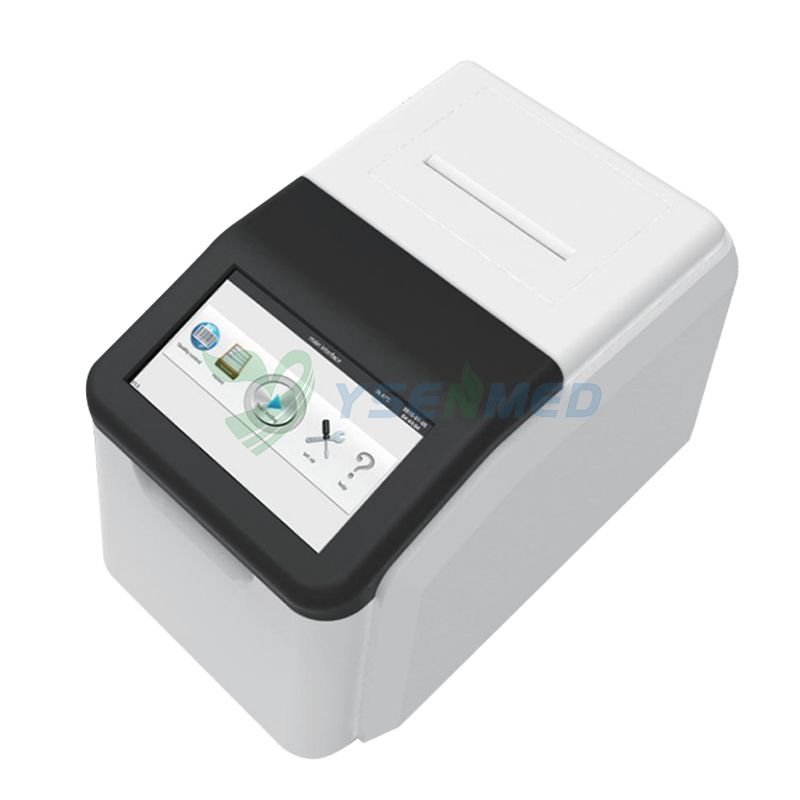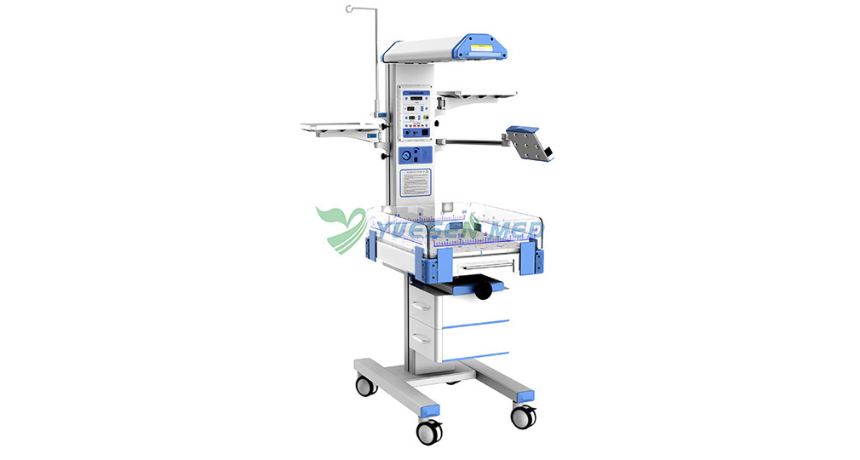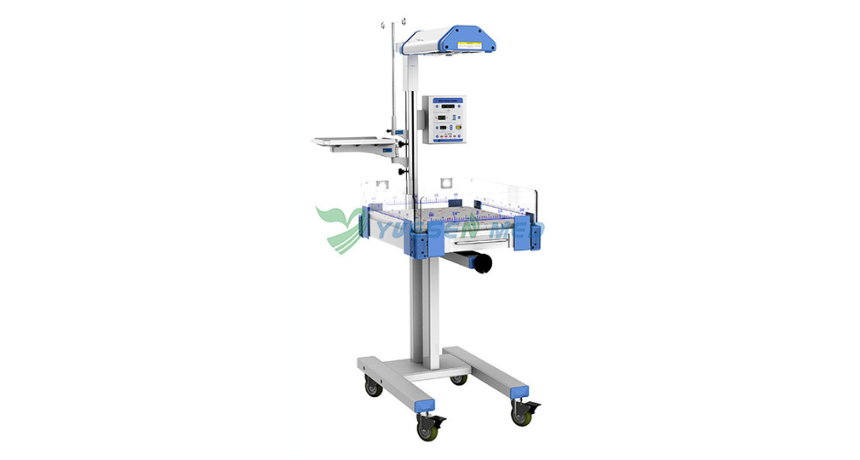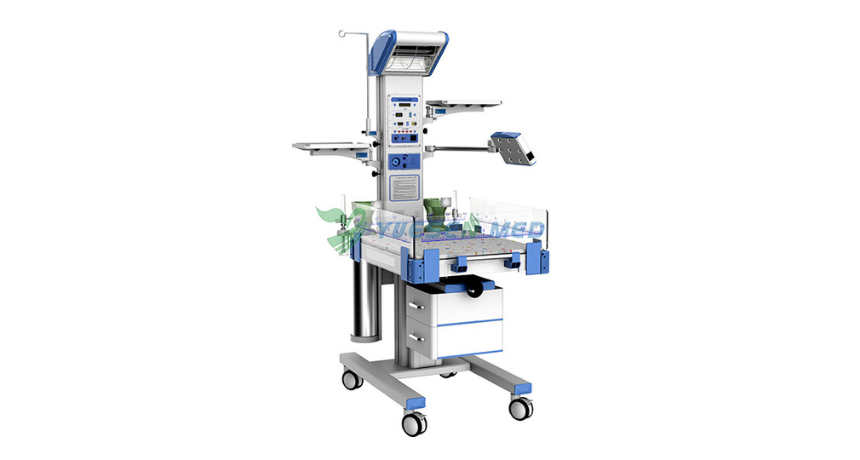Hot Products
YSX500D 50kW DR system set up and put into service in Cambodia.
YSENMED YSX500D 50kW digital x-ray system has been successfully set up and put into service in a hospital in Cambodia.
YSX056-PE serving as a vehicle-mounted x-ray in the Philippines
YSX056-PE 5.6kW portable x-ray unit has been adapted to fit on a truck, to provide mobile x-ray examination service for remote communities in the Philippines.
X Ray Machine To Zimbabwe
x ray machine, 50KW x ray machine
Microscope To Malawi
Achromatic objectives: 4X、10X、40X(S), 100X(S、Oil) Wide field eyepiece: WF10X(WF16X for option) Eyepiece head: Sliding binocular head inclined at 45° Stage: Double layer mechanical stage size 140X140mm, moving range 75X45mm Focusing: Coaxial coarse and
Portable Dry Biochemical Analyzers: Small Device, Big Impact in Medical Labs
Views : 1016
Update time : 2024-09-27 16:00:00
In the fast-paced world of medical labs, efficiency and accuracy are paramount. Enter the portable dry biochemical analyzer—a small device that's making waves in the healthcare sector. You might be wondering, how can something so compact have such a significant impact? Let's dive into the fascinating world of these innovative gadgets and explore their role in modern medicine.

What is a Portable Dry Biochemical Analyzer?
At its core, a portable dry biochemical analyzer is a compact device designed to perform biochemical analyses without the need for extensive liquid reagents. Imagine having a mini-lab right in your pocket! These analyzers utilize dry chemistry technology, which allows for quick, accurate results with minimal sample preparation.
The Evolution of Biochemical Analyzers
A Brief History
Biochemical analyzers have come a long way since their inception. The journey began with bulky machines that required large amounts of liquid reagents and extensive training to operate. Fast forward to today, and we have sleek, portable devices that are user-friendly and efficient. This evolution is a testament to technological advancements in the medical field.
From Lab to Field
Traditionally, biochemical tests were confined to laboratory settings. However, the need for rapid testing in various environments—like emergency rooms, remote clinics, and even at home—has driven the development of portable analyzers. This shift has opened up new possibilities for patient care.
How Do Portable Dry Biochemical Analyzers Work?
The Science Behind It
These analyzers use a process called dry chemistry, which involves the use of reagent-impregnated pads or strips. When a sample—like blood or urine—comes into contact with these pads, a chemical reaction occurs. The device then measures changes in color or light absorption to provide quantitative results. It's like a magic trick, but with science!
Key Components
1. Sample Input: Just a drop or two of your sample is needed.
2. Reagent Pads: These are the heart of the analyzer, where the chemical reactions happen.
3. Optical Sensors: They measure the results by detecting changes in light.
4. Display Screen: This is where you see your results, often in real-time.
Advantages of Portable Dry Biochemical Analyzers
Speedy Results
In medical emergencies, every second counts. Portable analyzers can provide results in minutes, allowing healthcare providers to make quick decisions. Imagine being in a critical situation where time is of the essence—this technology can be a lifesaver.
Cost-Effective
These devices can significantly reduce costs associated with traditional lab testing. With fewer reagents needed and less equipment to maintain, healthcare facilities can allocate resources more efficiently. Plus, patients benefit from lower testing fees.
User-Friendly Design
Gone are the days when only trained professionals could operate complex lab equipment. Modern portable analyzers are designed with the user in mind. Their intuitive interfaces make it easy for anyone to perform tests, even without specialized training.
Versatility
From glucose monitoring to electrolyte analysis, these devices can handle a wide range of tests. This versatility makes them invaluable in various settings, including hospitals, clinics, and even at home.
Applications in Medical Labs
Emergency Medicine
In emergency rooms, rapid diagnosis is crucial. Portable dry biochemical analyzers allow doctors to quickly assess a patient's condition, leading to timely interventions. Whether it's checking blood glucose levels or electrolyte imbalances, these devices are game-changers.
Remote Healthcare
In rural or underserved areas, access to traditional labs can be limited. Portable analyzers bridge this gap, enabling healthcare providers to conduct tests on-site. This means patients can receive immediate care without the need for long journeys to a lab.
Home Testing
With the rise of telemedicine, home testing has become increasingly popular. Portable analyzers empower patients to monitor their health from the comfort of their homes. This not only enhances patient engagement but also allows for continuous health monitoring.
Challenges and Considerations
Accuracy and Reliability
While portable analyzers are impressive, it's essential to consider their accuracy. Factors like sample quality and environmental conditions can affect results. It's crucial for users to follow guidelines to ensure reliable outcomes.
Training and Education
Even though these devices are user-friendly, proper training is still vital. Healthcare providers must understand how to interpret results accurately and know when to seek further testing. A well-informed user is key to maximizing the benefits of these analyzers.
The Future of Portable Dry Biochemical Analyzers
Technological Advancements
As technology continues to evolve, we can expect even more sophisticated portable analyzers. Innovations like AI integration and enhanced connectivity will likely improve accuracy and streamline workflows. Imagine a device that not only analyzes but also predicts potential health issues!
Increased Adoption
As awareness grows about the benefits of portable analyzers, we'll see broader adoption in various healthcare settings. This shift could lead to improved patient outcomes and a more proactive approach to health management.
Conclusion
Portable dry biochemical analyzers are revolutionizing the way we approach medical diagnostics. Their speed, cost-effectiveness, and user-friendly design make them invaluable tools in modern healthcare. As technology advances, we can only imagine the incredible impact these small devices will continue to have in medical labs and beyond. So, the next time you hear about a portable analyzer, remember—it's not just a gadget; it's a game-changer in the world of medicine!
FAQ
What are the main benefits of using portable dry biochemical analyzers in medical labs?
Portable dry biochemical analyzers offer several advantages, including rapid test results, which are crucial in emergency situations. They are cost-effective, requiring fewer reagents and less maintenance than traditional lab equipment. Their user-friendly design allows non-specialists to perform tests easily, and their versatility means they can conduct a wide range of analyses, making them suitable for various healthcare settings.
How accurate are portable dry biochemical analyzers?
While portable dry biochemical analyzers are designed to provide accurate results, their accuracy can be influenced by factors such as sample quality and environmental conditions. It’s essential for users to follow proper procedures and guidelines to ensure reliable outcomes. Regular calibration and maintenance also play a critical role in maintaining accuracy.
Can anyone use portable dry biochemical analyzers?
Yes, one of the significant advantages of portable dry biochemical analyzers is their user-friendly design. They are designed for ease of use, enabling healthcare providers without extensive training to operate them effectively. However, proper training on interpreting results and understanding when further testing is necessary is still essential.

What is a Portable Dry Biochemical Analyzer?
At its core, a portable dry biochemical analyzer is a compact device designed to perform biochemical analyses without the need for extensive liquid reagents. Imagine having a mini-lab right in your pocket! These analyzers utilize dry chemistry technology, which allows for quick, accurate results with minimal sample preparation.
The Evolution of Biochemical Analyzers
A Brief History
Biochemical analyzers have come a long way since their inception. The journey began with bulky machines that required large amounts of liquid reagents and extensive training to operate. Fast forward to today, and we have sleek, portable devices that are user-friendly and efficient. This evolution is a testament to technological advancements in the medical field.
From Lab to Field
Traditionally, biochemical tests were confined to laboratory settings. However, the need for rapid testing in various environments—like emergency rooms, remote clinics, and even at home—has driven the development of portable analyzers. This shift has opened up new possibilities for patient care.
How Do Portable Dry Biochemical Analyzers Work?
The Science Behind It
These analyzers use a process called dry chemistry, which involves the use of reagent-impregnated pads or strips. When a sample—like blood or urine—comes into contact with these pads, a chemical reaction occurs. The device then measures changes in color or light absorption to provide quantitative results. It's like a magic trick, but with science!
Key Components
1. Sample Input: Just a drop or two of your sample is needed.
2. Reagent Pads: These are the heart of the analyzer, where the chemical reactions happen.
3. Optical Sensors: They measure the results by detecting changes in light.
4. Display Screen: This is where you see your results, often in real-time.
Advantages of Portable Dry Biochemical Analyzers
Speedy Results
In medical emergencies, every second counts. Portable analyzers can provide results in minutes, allowing healthcare providers to make quick decisions. Imagine being in a critical situation where time is of the essence—this technology can be a lifesaver.
Cost-Effective
These devices can significantly reduce costs associated with traditional lab testing. With fewer reagents needed and less equipment to maintain, healthcare facilities can allocate resources more efficiently. Plus, patients benefit from lower testing fees.
User-Friendly Design
Gone are the days when only trained professionals could operate complex lab equipment. Modern portable analyzers are designed with the user in mind. Their intuitive interfaces make it easy for anyone to perform tests, even without specialized training.
Versatility
From glucose monitoring to electrolyte analysis, these devices can handle a wide range of tests. This versatility makes them invaluable in various settings, including hospitals, clinics, and even at home.
Applications in Medical Labs
Emergency Medicine
In emergency rooms, rapid diagnosis is crucial. Portable dry biochemical analyzers allow doctors to quickly assess a patient's condition, leading to timely interventions. Whether it's checking blood glucose levels or electrolyte imbalances, these devices are game-changers.
Remote Healthcare
In rural or underserved areas, access to traditional labs can be limited. Portable analyzers bridge this gap, enabling healthcare providers to conduct tests on-site. This means patients can receive immediate care without the need for long journeys to a lab.
Home Testing
With the rise of telemedicine, home testing has become increasingly popular. Portable analyzers empower patients to monitor their health from the comfort of their homes. This not only enhances patient engagement but also allows for continuous health monitoring.
Challenges and Considerations
Accuracy and Reliability
While portable analyzers are impressive, it's essential to consider their accuracy. Factors like sample quality and environmental conditions can affect results. It's crucial for users to follow guidelines to ensure reliable outcomes.
Training and Education
Even though these devices are user-friendly, proper training is still vital. Healthcare providers must understand how to interpret results accurately and know when to seek further testing. A well-informed user is key to maximizing the benefits of these analyzers.
The Future of Portable Dry Biochemical Analyzers
Technological Advancements
As technology continues to evolve, we can expect even more sophisticated portable analyzers. Innovations like AI integration and enhanced connectivity will likely improve accuracy and streamline workflows. Imagine a device that not only analyzes but also predicts potential health issues!
Increased Adoption
As awareness grows about the benefits of portable analyzers, we'll see broader adoption in various healthcare settings. This shift could lead to improved patient outcomes and a more proactive approach to health management.
Conclusion
Portable dry biochemical analyzers are revolutionizing the way we approach medical diagnostics. Their speed, cost-effectiveness, and user-friendly design make them invaluable tools in modern healthcare. As technology advances, we can only imagine the incredible impact these small devices will continue to have in medical labs and beyond. So, the next time you hear about a portable analyzer, remember—it's not just a gadget; it's a game-changer in the world of medicine!
FAQ
What are the main benefits of using portable dry biochemical analyzers in medical labs?
Portable dry biochemical analyzers offer several advantages, including rapid test results, which are crucial in emergency situations. They are cost-effective, requiring fewer reagents and less maintenance than traditional lab equipment. Their user-friendly design allows non-specialists to perform tests easily, and their versatility means they can conduct a wide range of analyses, making them suitable for various healthcare settings.
How accurate are portable dry biochemical analyzers?
While portable dry biochemical analyzers are designed to provide accurate results, their accuracy can be influenced by factors such as sample quality and environmental conditions. It’s essential for users to follow proper procedures and guidelines to ensure reliable outcomes. Regular calibration and maintenance also play a critical role in maintaining accuracy.
Can anyone use portable dry biochemical analyzers?
Yes, one of the significant advantages of portable dry biochemical analyzers is their user-friendly design. They are designed for ease of use, enabling healthcare providers without extensive training to operate them effectively. However, proper training on interpreting results and understanding when further testing is necessary is still essential.
Related News
Read More >>
 What is the Difference Between Radiant Warmer and Phototherapy?
What is the Difference Between Radiant Warmer and Phototherapy?
Apr .19.2025
Radiant warmers and phototherapy are crucial in neonatal care, but they serve different purposes. Let's dive into the nitty-gritty of these two techniques and explore how they differ, and when each is appropriate.
 YSX056-PE portable digital x-ray unit set up in the Philippines
YSX056-PE portable digital x-ray unit set up in the Philippines
Apr .19.2025
YSX056-PE portable digital x-ray unit has been set up in a hospital in the Philippines and the good quality images please the doctors.
 Is an Infant Radiant Warmer Good for Babies' Health?
Is an Infant Radiant Warmer Good for Babies' Health?
Apr .13.2025
What exactly is the infant radiant warmer, and how does it contribute to a baby's health? Let's dive into this topic and explore the ins and outs of infant radiant warmers.
 What is an Infant Radiant Warmer?
What is an Infant Radiant Warmer?
Apr .12.2025
One of the unsung heroes in neonatal care is the infant radiant warmer. But what exactly is it? Let's dive into the world of infant care and explore the ins and outs of this vital device.



